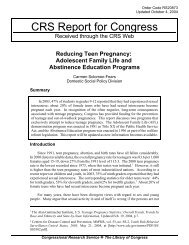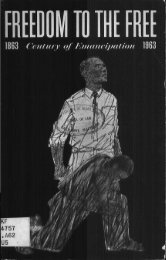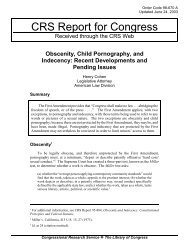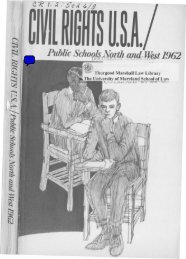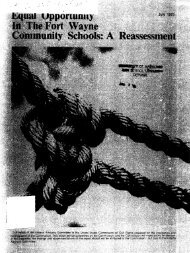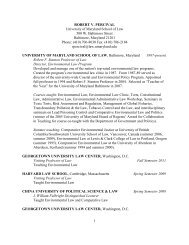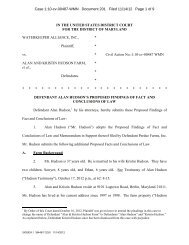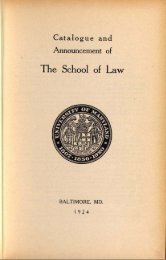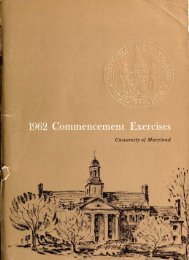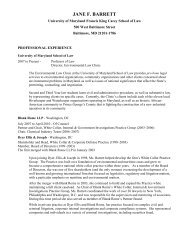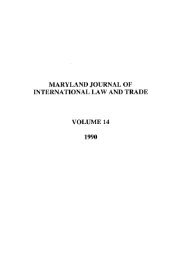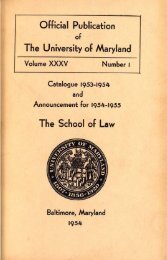University of Maryland School of Law : Catalog, 1988-1989
University of Maryland School of Law : Catalog, 1988-1989
University of Maryland School of Law : Catalog, 1988-1989
You also want an ePaper? Increase the reach of your titles
YUMPU automatically turns print PDFs into web optimized ePapers that Google loves.
the freedom <strong>of</strong> expression. The<br />
primary purpose <strong>of</strong> the course will<br />
be to examine the ways in which a<br />
constitutional system that is different<br />
from our own handles issues<br />
that are common to both systems.<br />
In this examination it may be possible<br />
to gain fresh insights about<br />
the American system when viewed<br />
from the standpoint <strong>of</strong> another<br />
body <strong>of</strong> constitutional doctrine.<br />
Among other topics, the course<br />
will consider such issues as the<br />
banning <strong>of</strong> radical political parties,<br />
the exclusion <strong>of</strong> radicals from the<br />
public service, police searches <strong>of</strong><br />
newspaper editorial rooms and<br />
abortion. In addition to translated<br />
selections from German decisions,<br />
American cases will be assigned for<br />
comparative purposes. All course<br />
material will be in English and no<br />
knowledge <strong>of</strong> German is necessary.<br />
This is a two-credit course. However,<br />
any student with a reading<br />
knowledge <strong>of</strong> German may take<br />
the course at his/her option as a<br />
three-credit seminar. This is a perspective<br />
course.<br />
Day (LAW 511 C) at 4:10 p.m.—<br />
Mr. Quint.<br />
Comparative <strong>Law</strong> (2)<br />
The course will focus on the civil<br />
law systems <strong>of</strong> France and Germany.<br />
The features <strong>of</strong> those systems<br />
covered will include: 1) the<br />
limited role assigned to the regular<br />
judiciary and the greater role<br />
played by specialized administrative<br />
and constitutional tribunals and by<br />
an all-encompassing code; 2) the<br />
non-adversarial features <strong>of</strong> both the<br />
civil and criminal justice systems;<br />
3) the law <strong>of</strong> obligations (i.e.,<br />
contracts and torts) as derived<br />
from Roman, code and judicial<br />
sources. The emphasis throughout<br />
the course will be on legal process<br />
rather than on substantive law.<br />
Day (LAW 506 C)— Not <strong>of</strong>fered<br />
<strong>1988</strong>-89.<br />
Complex Litigation (3)<br />
This is an advanced course in federal<br />
civil procedure. The focus is<br />
on the transformation <strong>of</strong> the traditional<br />
mode <strong>of</strong> litigation—the simple,<br />
straightforward two-party lawsuit—to<br />
a new model designed to<br />
handle the ever-increasing complexity<br />
<strong>of</strong> multi-party, multi-theory<br />
litigation. Also, the role <strong>of</strong> judges<br />
in this new model is more paramount.<br />
This course brings together<br />
the myriad procedures, techniques,<br />
theories and approaches which<br />
make up the process <strong>of</strong> complex<br />
litigation with the goal <strong>of</strong> expanding<br />
the understanding and expertise<br />
<strong>of</strong> lawyers who will litigate<br />
complex cases.<br />
Day (LAW 537 D)— Ms. Vaughns.<br />
Computer <strong>Law</strong> (2)<br />
This course is an introduction to<br />
the legal problems arising from the<br />
creation, transfer and use <strong>of</strong> computer<br />
hardware and s<strong>of</strong>tware. Following<br />
an introductory segment on<br />
understanding the computer, the<br />
course will cover such subjects as<br />
contract issues in hardware and<br />
s<strong>of</strong>tware procurement, remedies for<br />
computer system failure and defective<br />
s<strong>of</strong>tware, intellectual property<br />
rights in computer system and data<br />
bases, computer crime, and protection<br />
<strong>of</strong> privacy. No background in<br />
computer technology or terminology<br />
is required.<br />
Day (LAW 561 D)—Not <strong>of</strong>fered<br />
<strong>1988</strong>-89.<br />
Conflict <strong>of</strong> <strong>Law</strong>s (3)<br />
Presented in this course is the law<br />
relating to transactions with elements<br />
in more than one state, including<br />
jurisdiction <strong>of</strong> courts, enforcement<br />
<strong>of</strong> foreign judgments and<br />
decrees, choice <strong>of</strong> conflicting law<br />
in situations involving marriage<br />
and divorce, property and contracts<br />
and procedure.<br />
Day/Evening (LAW 507 C) at<br />
5:05 p.m—Mr. Reynolds.<br />
Constitutional <strong>Law</strong> (4)<br />
This course is a study <strong>of</strong> the constitutional<br />
system <strong>of</strong> the United<br />
States; judicial function in constitutional<br />
cases; division <strong>of</strong> powers<br />
between the states and the national<br />
government; powers <strong>of</strong> the<br />
president and Congress; limitations<br />
on the powers <strong>of</strong> government for<br />
the protection <strong>of</strong> life, liberty and<br />
property; national and state citizenship;<br />
and the constitutional<br />
protection <strong>of</strong> individual rights.<br />
Day (LAW 504 B)— Mr. Quint,<br />
Mr. Young; Evening (LAW 504<br />
F)— Ms. West.<br />
73



